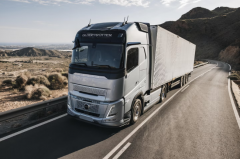
Volvo Trucks North America has teamed up with Linde Canada Inc., a prominent player in the industrial gas and engineering sector, for a distinctive and singular pilot initiative. This project involves the introduction of five Volvo FH LNG (liquified natural gas) powered trucks into the Canadian market. Volvo Trucks initiated the LNG truck line in 2017, which went into full-scale production in 2018 to cater to the European market. These trucks have consistently displayed impressive torque, performance, and durability while significantly curtailing CO2 emissions.
The Volvo FH gas-powered trucks have gained a reputation in Europe for their exceptional reliability and customer satisfaction. They are tailor-made for long-distance transportation, capable of handling weights of up to 60 tonnes Gross Combined Weight (GCW) and delivering up to 500 hp, covering distances of up to 1,000 km. These vehicles are equipped with Westport's cutting-edge high-pressure direct gas injection system, ensuring that they provide the same level of drivability, performance, and torque as diesel engines, all while drastically emitting less polluting gases than diesel.
“By embracing innovative technologies, Volvo Trucks continues to lead the shift in reducing CO2 emissions and bolstering environmental benefits through sustainable fuel options, including battery-electric, and fuel cell hydrogen, Volvo's LNG fueling approach – widely adopted in Europe – has proven its effectiveness in reducing CO2 emissions, offering fleets both a sustainable and efficient solution.”

By integrating Volvo FH LNG-powered trucks into its operations, Linde Canada aims to harness the advantages of LNG-powered tractors, including enhanced performance, reductions in CO2 emissions, and various operational benefits for its long-haul activities.
As part of the planned assessment at Linde Canada, a portion will involve regular scrutiny of the vehicle and driver fuel efficiency, leveraging the company's advanced logistics and scheduling system that optimizes routes to minimize mileage. The deployment of five Volvo FH models, powered by LNG and offering power ratings of 420, 460, or 500 hp along with up to 2,500 Nm of torque, is scheduled to take place on Canadian roads later this year. To facilitate the seamless integration of the Volvo FH trucks into its fleet, Linde Canada is in the process of establishing its own LNG supply and infrastructure.
According to Volvo, utilizing LNG as a fuel presents numerous benefits, notably a higher energy density when compared to compressed natural gas (CNG), allowing for a range comparable to diesel. Furthermore, there is a noteworthy 20 percent decrease in tank-to-wheel CO2 emissions in comparison to diesel. Beyond these advantages, LNG engines also contribute to an improved driver experience, marked by substantial noise reduction and smoother operational traits when juxtaposed with their diesel counterparts. With these characteristics, LNG engines could pave the way for the widespread adoption of LNG fuel as an alternative energy source that could replace diesel in the future.








